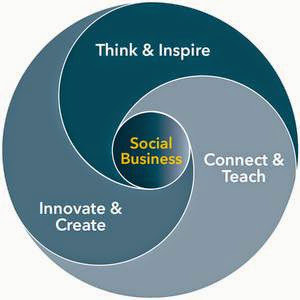Students, as "customers", are informed and influenced by a social community and by our adaptability to their needs, not by recruitment officers with shiny pamphlets. Donors, as "partners", rightfully demand information sharing, engagement and value, just as they would of the companies they invest in and purchase from.
How can we give them what they seek? Enhance what we already do well - knowledge sharing and community building - with the evolution of social media, social marketing and, wait for it...social business.
Social business, as defined by SideraWorks is:
"the creation of an organization that is optimized to benefit its entire ecosystem (customers, employees, owners, partners) by embedding collaboration, information sharing, and active engagement into its operations and culture. The result is a more responsive, adaptable, effective and ultimately more successful company."
 |
| source |
The only stretch is now to do all of these good things in a more strategic way, on a much bigger platform, and for a much wider audience.
But it takes work.
- It means a heck of a lot of transparent internal communication and installing the right technology platforms to do it with.
- It means educating leadership on the benefits of empowering all employees to solve problems, share insights and connect with each other and directly with our customers and partners in order to adapt and evolve.
- It means involving our customers in forming what the product they are paying for will be.
- It means a shift in thinking by the marketing team to publish content that is consumer and partner-centred, instead of news celebrating our own achievements and credentials.
- It means convincing faculty members that giving their time to speak at public seminars and blog about insights into industry or society will pay off for them in the future with more funding for their work.
- It means listening to what our alumni need to improve their lives and then giving it to them, instead of flooding them with emails to attend events that may not be meaningful to them.
- And it means directing financial and human resources to take advantage of new social technology and opportunities.
And the revenue will follow. More importantly, that revenue will be more purposefully directed to the projects and programs that have direct impact on growth - because it will come from partners and customers making informed choices due to engagement with the people who are creating change.
Demonstrating value, connectivity, and collaborative innovation is what will transform an institution into a social business, and thereby drive advancement success.
Note: another good resource on how to build a social business is at Social Business Forum.
No comments:
Post a Comment